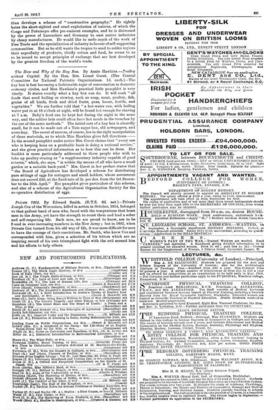The How and Why of the Hay Box. By Annie
Ilawkins.—Poullry without Capital. By the Hon. Mrs. Lionel Guest. (The Central Committee for National Patriotic Organizations. Id. each.)—The hay box is fast becoming a fashionable topic of conversation in domestic economy circles, and Miss Hawkins's practical little pamphlet is very timely. It states exactly what a hay box can do. It will cook "all foods that need boiling or stewing, such as soup, meat, poultry, fish, grains of all kinds, fresh and dried fruits, peas, beans, lentils, and vegetables." We are further told that "a hot-water can, with boiling water put in at 10 o'clock at night, will be found hot enough for shaving at 7 a.m. Baby's food can be kept hot during the night in the same way, and the soldier lads could often have hot meals in the trenches by the use of the same methods." The initial cost of a hay box is absurdly small, for it can be made out of a Tate sugar-box, old newspapers, and some hay. The secret of success, of course, lies in the right manipulation of these materials, as to which Miss Hawkins gives full directions.— In the second pamphlet under notice Mrs. Guest claims that "every one who is keeping hens on a profitable basis is doing a national service," and she gives practical information as to how this can be done. Her booklet is more particularly addressed to those people who wish to take up poultry-rearing as "a supplementary industry capable of good returns," which, she says, "is within thp means of all who have a small garden or a suitable back-yard." Mrs. Guest in her preface states that " the Board of Agriculture has developed a scheme for distributing pure sittings of eggs for cottagers and small holders, whose assessment does not exceed £50, at the fixed rate of 2s. per doz. from the 1st Decem- ber to the 30th April." Her pamphlet gives particulars of this scheme, and also of a scheme of the Agricultural Organization Society for the co-operative distribution of eggs.


























 Previous page
Previous page